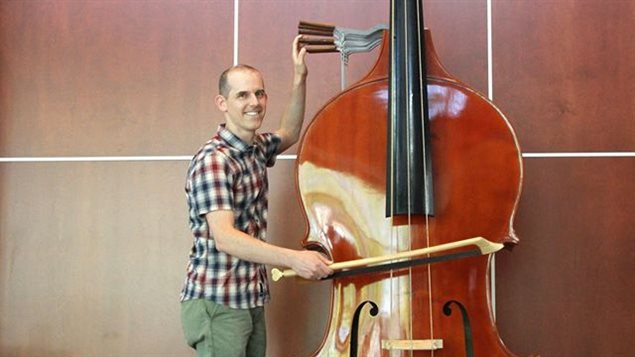The Orchestre Symphonique de Montréal has premiered its sepulchral new instrument in Strauss’ Ein Heldenleben.
Canada’s Orchestre Symphonique de Montréal has premiered its brand new instrument – an octobass – in a performance of Richard Strauss’ Ein Heldenleben. The massive instrument, the lowest in the string family, is 3.6 metres tall and weighs in at a hefty 131kg. The OSM’s octobass is one of only three known octobasses in the world – and is the only one that is perfectly functional. Each of its three gut strings is over two metres long.
 OSM double bassist Eric Chappel
OSM double bassist Eric Chappel
Invented in Paris in 1849 by Jean-Baptiste Vuillaume, the octobass appears in Hector Berlioz’s treatise on orchestration. In fact, the composer wrote that he wished to include the octobass in all his works for large orchestra. The instrument acquired by the Montreal Symphony is a faithful reproduction of Vuillaume’s model and the only perfect replica of the upgraded original from 1851, which is currently on display in Paris’s Musée Instrumental de la Cité de la Musique. The instrument is so large that the performer must use a system of levers and pedals to access the strings. The replica was created in the workshop of Jean-Jacques Pagés, with clock and pendulum maker Michel Jolly recreating the 237 parts of the complex mechanism.
Adding an octobass to the OSM’s roster of instruments has long been a dream of the orchestra’s Music Director Kent Nagano. “We have been working on this project for seven years,” he explained in an interview with Huffington Post. “Finally, everything came together in a very quick way. A major sponsor, a friend of the orchestra, stepped forward fascinated by the venture. Our sponsor was equally curious as to what it would sound like, an instrument that apparently has a huge projection and is able, as a single instrument, to be felt and to be heard within the context of a very large Romantic orchestra.”
The OSM’s double bassist Eric Chappel played the instrument in its Canadian debut, in a performance of Ein Heldenleben, which was written in 1887-88. “It was meant to double the bass line, in a kind of ad libitum fashion,” said Nagano. “From what we have read, it was prominent in literature that was written from the 1850s up until the turn of the century. So, since Berlioz has written most about the octobass, we’ll be applying it mostly for Romantic French music. But we did want to try it out with Ein Heldenleben because apparently it did make its way to Germany as well.”
“Probably for practical reasons, because it doesn’t travel at all,” Nagano says in a video released by OSM, “that particular octave of the string group was slowly abandoned. What we’re trying to do at the OSM is to bring back the sonorities that were heard in the 19th century.”











Comments
Log in to join the conversation.